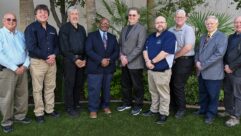The author is a field analyst with the New America Foundation’s Open Technology Initiative, a board member at Allied Media Projects and a longtime organizer at Prometheus Radio Project. She prepared these remarks for the Allied Media Conference in June. They appeared on the website of the New America Foundation.

It was a dream that never died — thousands of groups across the United States fighting for their own community radio stations. Now, after 10 years of struggle, the movement to expand community radio can celebrate a big victory with the bipartisan passage of the Local Community Radio Act. And hundreds if not thousands of communities across America can get ready to own their own pieces of the FM dial: their own local radio stations.
Even before 2000, community groups disgusted by lack of access to the media — a vital tool to support local music and culture, as well as to engage in vital policy debates — took to the airwaves without a license. From housing projects broadcasting in Springfield, Ill., to the hills of Berkeley, Calif., hundreds of groups went on the air using low-power stations, offering voices to youths, activists, pastors, immigrants and many others. But the Federal Communications Commission could have shut these stations down at any time.
Some groups, including my longtime fellow organizers at the Prometheus Radio Project, threw down the gauntlet and said that it was high time for the FCC to legalize low-power FM radio. The commission established the service with widespread support.
But in the middle of the first — and so far only — window that groups had to apply for LPFM stations back in 2000, the National Association of Broadcasters, joined by National Public Radio, stopped the service in its tracks, limiting LPFM to America’s most rural areas by pushing Congress to pass the Radio Broadcasting Preservation Act of 2000. Claiming that new community radio stations would cause technical interference — static on the dial — if placed too close to full-power stations in big communities, the law restricted LPFM to small towns, and with the stroke of a pen thousands of stations lost the right to get licenses and LPFM was limited to rural areas only.
Big cities were out of luck until the FCC could prove that there was plenty of room on the FM dial for low-power stations in the cities that wanted them. The FCC came out with an independent study proving that in 2003 — but big broadcasters kept whining that new radio stations anywhere close to them would cause static on the dial.
No technical problem
Then something incredible happened — the diverse movement fighting to expand low-power FM radio grew even larger and with patience and perseverance started to make the big broadcasters look increasingly greedy for keeping communities off the air.
Low-power FM stations made national news in 2005 after they saved lives in Louisiana, Mississippi and elsewhere in the Gulf of Mexico after Hurricane Katrina. Bipartisan legislators listened closely to engineers who volunteered to keep WQRZ(LP) of Bay St. Louis, Miss., on the air — the only station that was able to stay up to serve Hancock County, a region devastated by both Katrina and Rita. The station became so vital for public safety and for families looking for hope and healing that the Emergency Operations Center for all of Hancock set up shop with WQRZ.
Similar stories and a coalition that grew to include pastors, emergency responders, justice organizers and local politicians forced Congress to drop the party line that LPFM was a technical problem. Legislators such as Rep. Mike Doyle, a Pittsburgh Democrat who was beginning to demonstrate great leadership on telecommunications issues, were joined by people including Rep. Lee Terry, who had heard from Baptist church leaders and former YMCA directors that Omaha, Neb., needed low-power radio now.
Legislative volunteers in ironed secondhand khakis and shoes researched legislative districts and helped legislators support low-power service because it really mattered, and racked up more than a hundred cosponsors on a bill aimed to bring community radio back to the cities. Self-trained engineers and radio enthusiasts went to the FCC both in D.C. and at field hearings around the country, bringing hundreds of people along who needed the FCC to stand up to Congress; to fight for a diverse, representative media; and to expand the service they’d created.
Unfailing belief
The breaking point was 2010. President Barack Obama had become an LPFM cosponsor during his last months as a senator, and an emboldened Commerce Committee and then the full House of Representatives finally passed the bill to expand LPFM, despite the increasingly isolated NAB’s objections. And longtime LPFM supporters, such as Sen. Patrick Leahy, were telling reporters that passing the bill to expand LPFM was only a matter of time.
But the NAB wasn’t ready to give up the fight just yet. As the Senate moved to expand LPFM, the NAB, led by former Oregon Sen. Gordon Smith, started organizing old friends in the Senate to use secret holds to block the LPFM radio bill. Time was against us — would the bill die in the Senate? Would LPFM supporters have to start again, in a new Congress hostile to potential new community voices on the left, right, and center?
It’s still hard to believe that we won, but I know that we did because of the passion, clarity and unfailing belief of supporters nationwide.
Advocates from inside and outside the Beltway visited and called every U.S. Senate office time after time to ask senators if they were blocking the bill. When senators wouldn’t tell us, their constituents took to the line. Every week we’d discover another community leader in Alabama, Florida, Wyoming or elsewhere that personally knew their senator and could speak from experience as to why having LPFM in town would save lives and build communities. And every time a senator was outed as a blocker of the bill, constituents would convince that person to drop their block and stand with their own communities.
News reports described the NAB as isolating itself from congressional allies by continuing the fight to kill new LPFM stations — why would a big lobby spend precious political capital on community radio? LPFM supporters and stations from Seattle to Illinois to Massachusetts descended with circus gear and hula hoops at the NAB’s headquarters in D.C., demanding that the NAB stop making the legislative process a circus, and to stop making LPFM jump through hoops!
Some of the lead bill sponsors, Sens. Maria Cantwell and John McCain and Reps. Mike Doyle and Lee Terry, sat the NAB down and told them to stop fighting LPFM expansion. The sponsors negotiated a deal with the big broadcasters ensuring that big stations would be protected from any low-power interference, and suddenly — in the last moments of the 111th Congress — the Local Community Radio Act was passed!
Continue the struggle
Now we have a chance to get thousands more LPFM radio stations in big cities and smaller communities nationwide.
I’ll always remember the tireless efforts of longtime LPFM hopefuls such as media educator Frank Bluestein, who led elected officials in his home of Germantown, Tenn., including the mayor, to push conservative senators to become supporters and sometimes leading advocates for LPFM across Tennessee. I’ll always be humbled by the selfless leadership that existing LPFM stations took to help others struggle for their chance to get on air — almost always on their own dime and their own time.
Now they’ve done what few others have ever done — passed legislation to build community infrastructure meant for people, rather than big companies. But their work, and ours, is not done.
In the next few years, sooner rather than later, the FCC will open up a window for communities to apply for free, 100-watt, low-power FM local community radio stations.
First, the FCC needs to take the new law that Congress passed and turn it into rules for how that window will work, and how and where we’ll get the chance to apply. We weren’t able to pass the Local Community Radio Act unscathed — big broadcasters negotiated to get amendments attached that could make it harder for groups to get on air — and in July the FCC will look at whether or not to implement the spirit of the law or give hard-won community spaces away to translator stations that rebroadcast distant signals.
It is our responsibility to continue the struggle, and many of us have already spoken out to defend the law we won in December. We also must get communities ready to apply for stations and work at the FCC to make sure that they permit as many stations as possible.
As I write this and reflect on what our movement has won, I know that the lessons we’ve learned — where we succeeded and where we were challenged — reflect many other movements’ histories and can inform other battles in telecommunications and beyond. We talked about these lessons at the National Conference for Media Reform and will talk about them again at the Allied Media Conference — reflecting on this and other movement struggles is just as important as the LPFM struggle, training us to win even more for our communities in the future.
After more than eight years working on and off with Prometheus, I’m excited to be bringing what I’ve learned struggling with them to new technologies — I’m now working in my home city of Philadelphia and elsewhere to help communities build access to the Internet that they haven’t had before.
The fact that we’ve won such a huge victory in expanding LPFM should broaden our vision of what owning our own media can mean. I imagine community media centers where our kids, moms, elders and friends can learn Internet skills and literacy; broadcast to their neighbors; create community news for Web, radio and TV; and build power to affect politics and culture locally and beyond. The movement we’ve built to make this possible now has to do the hard work to actually make it happen — and I can’t wait to do that beautiful work with all of you.
Comment on this or any story. E-mail [email protected].










